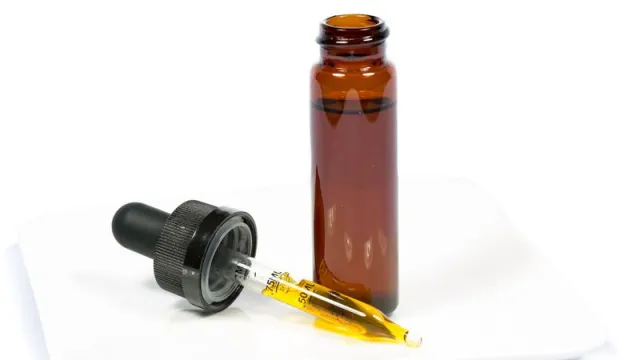- Your cart is empty
- Continue shopping

What is a tincture, and how is it made?
An Herbal Tincture is made with using an extraction process. Using a water-based or alcohol solvent with certain herbs brings forward a tincture. Alcohol is generally the most useful for extractions, but vegetable glycerin and apple cider vinegar may also be used for the process.
A tincture is a concentrated liquid herbal extract prepared by adding all or specific medicinal properties of an herb to alcohol. Popular extraction processes include alcohol-free or brushing liquid herbal extracts with glycerin.
After two to six weeks in the solution, the tincture is finally ready for use as a dietary supplement. It can be taken from the dropper or dissolved in water, juice, or tea. If you take a tincture under the guidance of a herbalist or holistic health professional, you may be advised to take it twice or thrice a day, depending on your health.
Are tinctures safe?
Most tinctures contain ethyl alcohol, high-proof alcohol that is easily accessible and safe for consumption. The quantity of tincture used generally falls between 20 and 40 drops, which means that the amount of alcohol consumed is negligible.
Are tinctures weak?
Since they’re concentrated extracts, tinctures can be stronger than herbal tea. Many people find it surprising that just a few droplets can deliver so much benefit. Less is more about tinctures! Plus, the alcohol functions as a Trojan horse, allowing the properties of the herbs to be absorbed directly into the bloodstream more quickly than capsules or herbal pills.
Why take herbal tinctures?
Herbal tinctures are an excellent way to use herbal medicine for various purposes. They are easily absorbable, short-lived, solid, and influential treatments, simple to transport, and reliable to use. Tinctures are shelf-stable and active ingredients from herbs that remain potent and active for several years after production. Water contains a variety of agents, including alcohol and solvents that can pull numerous constituents into it. It’s a highly effective method for extracting herbal medicine from plants.
Why do we offer alcohol tinctures?
Certain herbs will retain their medicinal properties even after being distilled by a weaker solvent than alcohol. Alcohol-based tinctures are appropriate for kids, pregnant mothers, and breastfeeding women since the amount of alcohol consumed per dose are equivalent to eating a very ripe banana.
Alcohol has been used in herbal tinctures as a solvent. It’s an inherent solvent used today for its fast-acting properties, potency, and ability to maintain tinctures’ shelf-life. A small amount of alcohol is used when we use a herbal tincture, but it’s still a very safe and effective way of delivering our favorite herbal remedies.
The Herbal Toad uses high-proof organic grain alcohol that is obtainable to purchase as well as safe for consumption. Tinctures are taken in tiny doses (usually between 20 and 40 drops), so the amount of alcohol consumed is inconsequential.
Tincture Dosages
Keeping the liquid below the tongue and avoiding other liquids or foods for a minimum of 15 minutes afterward yields the best results when taking tinctures. Tinctures are usually taken by the dropperful (also called a squeeze).
A dropperful is the amount of liquid that runs through the bulb of a dropper. The entire bulb is squeezed and released. The liquid will fill the glass tube only a short distance, but that’s considered a “dropperful.” A dropperful equals roughly 30 drops.
On all dropper tops, regardless of the alcohol dosage they include, the bulb (whatever you press) is uniform in size on them. The bulb’s size determines how much liquid is poured into the tube, not the length of the tube.
The suggested standard adult dosage for tinctures is 2 droppersful two to three times daily.
With this standard dosing suggestion (for adults) of two droppersful of tincture three times a day, tincture bottles will last this long.
- 2oz. tincture bottle will last two weeks
- 4oz. A tincture bottle will typically last about a month.
When is taking a tincture better than taking capsules of raw herbs?
Most people first infuse herbs in water or alcohol. The efficacy of these remedies will vary based on their preparation. If someone with a compromised digestive system prefers convenience, they may prefer a liquid tincture. Supposing someone is sensitive to alcohol, they may prefer a glycerin-based tincture.
If you are in sound health, you can choose whichever tincture you’re comfortable with! Taken as directed, herbs are a sensible and complementary way for the entire body to recuperate on its own.
Which is more effective? A tea or tincture?
Although the many plants such as dandelion, holy basil, and ginger that are used as teas can be turned into and consumed as tonics, tinctures differ fundamentally in that their intensity is much higher; a simple dropperful of a tincture is more potent than a cup of steeped tea.
What is the difference between an herbal extract and a tincture?
We can say that a tincture is an extract dissolved in an alcoholic solvent. While an extract is dissolved in non-alcoholic solvents such as water, glycerin, vinegar, etc., thus an extract is made by cold process extraction. Another dimension is the basis of the material from which the extract is made.
Do tinctures contain gluten when made with grain alcohol?
No, gluten-made tinctures do not contain gluten. Even grains-containing liquor, as it’s distilled, lacks gluten. The reason is proteins (gluten) do not pass through distillation. Gluten is a protein, and proteins are not volatile. Only volatile substances pass through distillation.
Are herbal tinctures vegan?
Of course, they are 100% vegan—no animal byproducts in any of QuietQrew Herbal tincture formulas.
When should I take tinctures?
Tinctures can be taken at any time of day, with or without food. Add the prescribed amount to a little bit of water or juice, or take some directly from a spoon. Bitter herbs for digestion should be taken on an empty stomach. 30 drops = 1 dropperful.
How long do herbal tinctures stay in your system?
The most bioactive parts of herbs are cleared from the body within 4 hours, so it’s best to take herbal tinctures 2-4 times a day rather than a large dose once daily. In acute cases, tinctures can be taken every hour or two for a short period.
Is it better to take a tincture or capsules?
Due to the high absorption rate, herbal tinctures are much more effective than capsules. Not only do you get more significant quantities of nutrients and chemicals with less time used for metabolism, but they are very easily absorbed into your body in just four minutes.
How many drops are in a tincture dropper?
1 dropper complete = approx. 35 – 40 drops
What is the best way to take tinctures?
Insert a dropper or small syringe containing liquid into the mouth and allow it to run below the tongue. Hold the liquid in the mouth for a few seconds before swallowing. Thoroughly rinse your mouth with water afterward.
Can you drink water after taking a tincture?
It is recommended to wait at least a few minutes before drinking water or other beverages so that you can receive the possible benefit.
Can you take a tincture straight?
Tinctures can be taken on their own or in tea or sparkling water. Tinctures may also be added to cocktail recipes to add flavor.
What kind of alcohol is used in tincture?
Traditional herbal tinctures are produced through steeping herbs in strong alcoholic ethyl alcohol (sometimes vinegar) to extract and concentrate their medicinal constituents, substances that plants manufacture for self-protection and that humans infiltrate for their medicinal uses.
Should herbal tinctures be taken on an empty stomach?
Most tinctures or extracts should be taken on an empty stomach, up to 30 minutes before eating or between meals 2 hours after the last time you ate. This will help accelerate absorption.
Do tinctures need to be refrigerated?
In terms of shelf lives, alcohol-based tinctures have an indefinite duration and do not need to be refrigerated if kept in a cold, dark place. Vegetable glycerine-based tinctures must be refrigerated and last up to 3-5 years. Vinegar-based tinctures should be kept in the refrigerator and last up to one year.
Look at our variety of purely natural herbal tinctures if you need handmade, organic preparations that use the tincture. Need extra help? Schedule a health consultation to receive personalized advice on achieving your specific health and well-being goals.


Thanks.
Good post.